This book is intended more for the members of the extended family; the book has long since sold out. The following summary is intended to highlight some of the more important points.
Charlton Whittall originally of Worcester, sent two of his sons to Smyrna
as apprentices with the firm R.F. Breed and Co., Charlton jnr 1809. Only
2 years after arriving in Smyrna, Charlton Whittall formed C. Whittall
and Co. and a year later was admitted a member of the Levant Company.
Continuing to work with Mr Breed, Charlton brought out his younger brother
James to help him and gave him a third share of the business. Both later
married foreign wives of European descent, as also the two sons of Charlton,
but nearly all the later generations married English girls. They settled
in Bornova, a village out of town that was to acquire an increasing European
character as time went by. It was not until 1880s that there is any mention
of sports. Football, tennis and golf were gradually introduced and nearly
all the grandsons of Charlton took up shooting and fishing as relaxation
and later owned yachts.
Letters surviving show Charlton was highly observant of ships that were
visiting Smyrna, good on board, and prices, answered by his father in
Liverpool. Thus with this information, trade opportunities were seized,
allowing the Whittalls to quickly amass a fortune, providing employment
to sons and grandsons. James his brother and partner died in 1836, third
son Charlton, James was admitted as a partner in 1851. Charlton died 1867,
by which time the firm dealt chiefly with export.
The assistance given to Turkey during and after the Crimean war by the
Western Powers encouraged foreign investment in the country. This resulted
in the building of the railways, the founding of the Imperial Ottoman
bank, the introduction of Posts and Telegraphs, and the extension of the
Smyrna port. All these facilities helped the development of the activities
of C. Whittall and Co.
In 1878 James handed over the business to his three sons, Richard Watson,
Edward and Herbert Octavius. Eldest son James William (later Sir William
Whittall), having represented the firms interest in Manchester since 1860,
founded his own firm in Constantinople in 1873.
C. Whittall and Co. now had built and equipped a factory for the extraction
of the tanning properties of valonea by a process discovered by a local
chemist, an Armenian, Elmasian, and patented by the firm. It became interested
in a cotton-seed oil mill in Mersin on the Mediterranean coast, erected
under its auspices and held a majority share in a fruit bleaching [drying?]
factory in Smyrna.
A cousin of the later partners, Mr C. J. Giraud, on being refused a partnership
in the business, broke away before 1914, founded the firm under his own
name and took with him the fruit business.
The First World War caused the break up of the old establishment, all
trading ceased and 3 partners died in quick succession and in 1922 Herbert
Octavius retired to Tunis. After 1922, the firm’s interests were
taken up by Herbert James, son of Herbert Octavius. Owing however, to
the dispersal of the estates of the various partners, the resources of
the company were limited and it was only thanks to the financial assistance
given in 1927 by Frederick James Whittall, a retired tea planter from
Ceylon, that the firm was able to carry on. Frederick James was a grandson
of James snr., one of the original partners. C. Whittall and Co was liquidated
in 1938 on the death of Frederick James and also because of the financial
crisis of the later 20s and early 30s.
Herbert James, however, then formed a smaller company, H. Whittall and
Co, to carry on such business as remained. He died in 1953 and was succeeded
by his sons, Douglas George and Victor, who still maintain the company
[now?].
The story of J.W. Whittall and Co of Constantinople is
more complex. At the time Sidney La Fontaine was acting agent in the city
for J.C. Harter and Co. and together they formed J.W.Whittall and Co.,
giving La Fontaine a 30% share in the business. By 1885 La Fontaine had
left and the company was incurring heavy losses, and the young son of
James, Edwin was admitted as a partner with a 35% share. The dealings
in the U.K. were still carried out through J.C. Harter and Co, till 1911.
The firm then began to prosper and by 1910, the 3 partners’ activities
included export of mohair, hazelnuts, opium, malting and feeding barley,
maize, oats, seeds etc. The company acted as agents in marine insurance
through Lloyds in London, as well as a mining branch, managed by Mr Goodwin,
under the supervision of Edwin, in Borax concessions in Susurluk, and
owned a mercury mine in Karaburun,
near Smyrna, exploited till 1914, and after WWI till 1925 [ruins still
visible].
All activities ceased with the war of 1914-18, however in 1918, was reformed
with the old partners (and some new) resuming their roles, and with the
responsibilities of the same wide business interests again divided among
the partners. However difficulties arose with the fact that Turkish trade
law had to abided by after 1923, the Karaburun region was declared a military
zone in 1925, closing the mine (site sold in 1932), in the 30s the Turkish
government gradually took over purchase of opium, barley etc., a promising
partnership in artesian wells with a German company had to be abandoned
with the outbreak of WWII. Devaluation of the Turkish lira was a perennial
problem, with various business ventures of mixed success were undertaken,
till closure in 1969. One of the last successful ventures of the company
was on a commission basis of 9 ferry boats built by Fairfields of Glasgow,
the first delivered in 1961, which continue to remain in service in the
waterways around Istanbul.
There were also minor allied companies, such as Whittall Saltiel Co. Ltd.,
acting in Greece, specialising in the export of opium, in the early 20th
century. The Istanbul based Levant Iron and Machinery Co. Ltd. was a specialist
importer working on and off between 1920 and 60s. Finally the England
based J. & H. Whittall and Co. Ltd. between 1910s and the present
time has specialised in the sale of selling in the U.K. Turkish goods,
shipped by the two Whittall companies and others.’
Note: The book also gives details
of the social scene of the British community of Istanbul centred in Moda
at the time.
‘…in Moda alone there were 95 British residents in 1877 and
149 in 1906. Thanks to the Capitulations the British lived and worked
quite apart in a world of their own. They had their own Consular Court,
presided by a British judge, a prison, Post Office, hospital and Seaman’s
home. There were British lawyers and doctors, one practicing in Moda.
Their private properties were inviolable by the local authorities. There
were English shops in town such as Bakers, Haydns and Harty’s Stores.
Apart from the more international Constantinople Club, dominated by the
British, there were the purely British Club in Pera and the Kadıköy
Library and Institute in Moda.
In the field of sports the community dominated. At one time five cricket
elevens played for a shield. Cricket was played in Beicos and by ‘the
river’ near Moda. For a short period a rugby fifteen played against
Smyrna. Regular annual football matches were played against Smyrna at
Moda. Tennis tournaments were played alternatively at Bebek, Therapia
and Moda. Polo was played at Büyükdere and annual regattas were held in
Moda bay.
Unlike Bournabat, Moda itself as a village was not distinctive in character
– there was no style or architecture about the homes, many of which
were built of wood. Internally they were more attractive with open coal
fire places and parquet floors in all the reception rooms. Its redeeming
features were the gardens, the sea, the views and sunsets over the town.
Today Moda has lost all its personal character and ambience. Of the sport
facilities only the Deniz Klubü, the successor of the Moda Yacht
Club remains, but without the yachts!
The capitulations were abolished after the First World War and the British
residents had to integrate themselves with the laws of the new Turkish
Republic. Gradually the younger generation emigrated and dispersed to
such an extent that the British residents in Moda were reduced to 65 by
1940 and now (1973) numbers only 13.’
 |
 |
 |
 |
 |
 |
 |
 |
 |
 |
 |
 |
 |
 |
 |
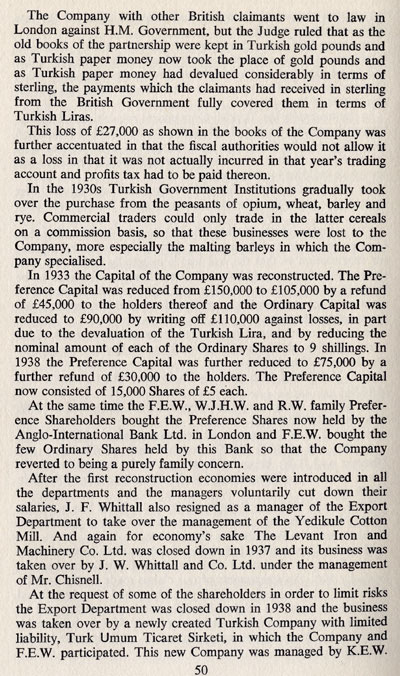 |
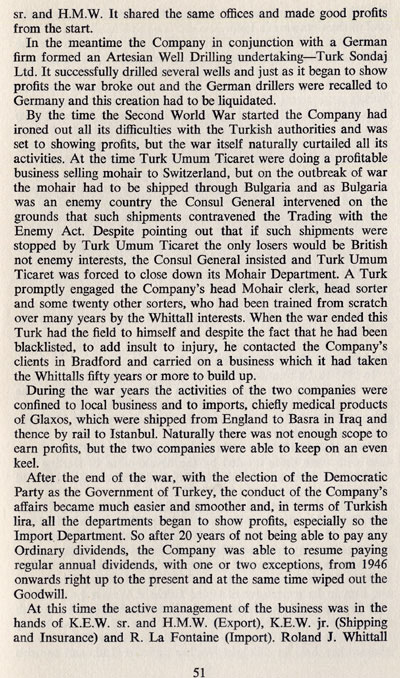 |
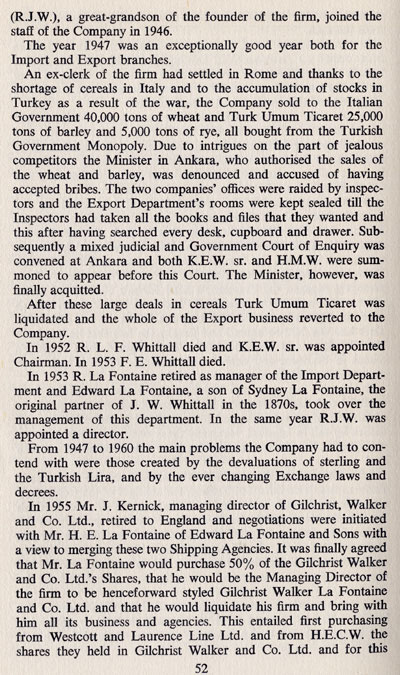 |
 |
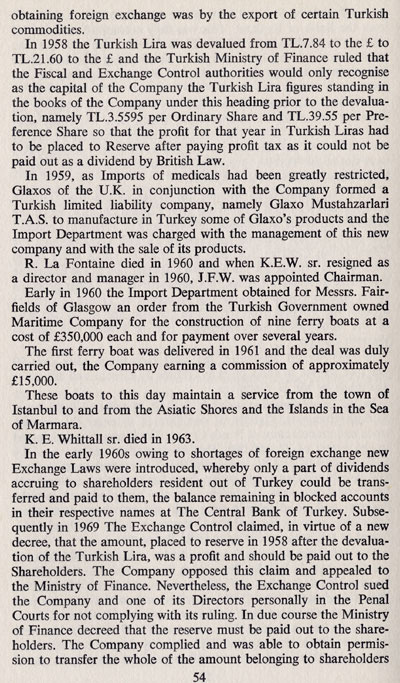 |
 |
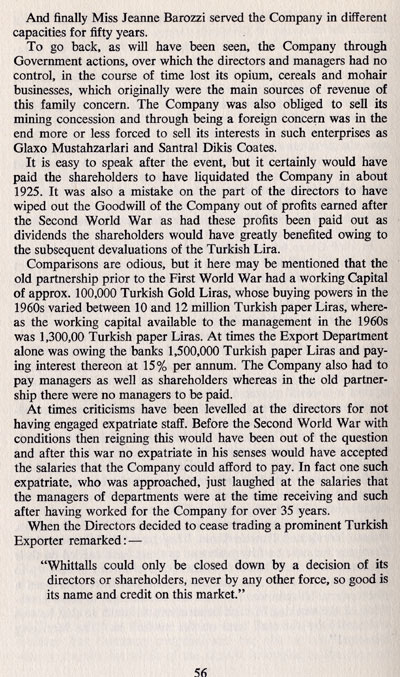 |
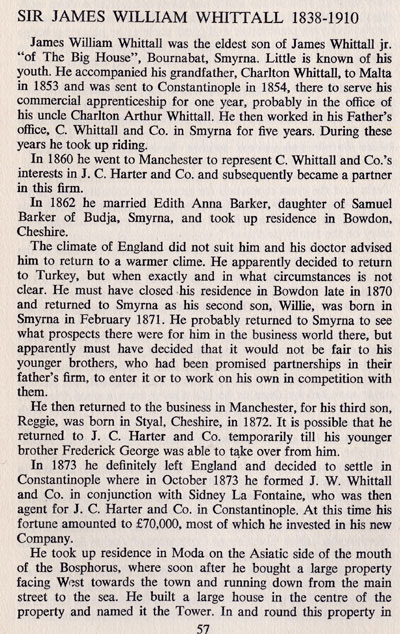 |
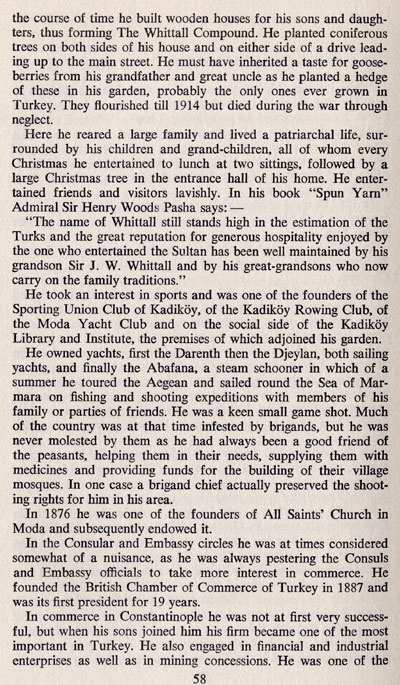 |
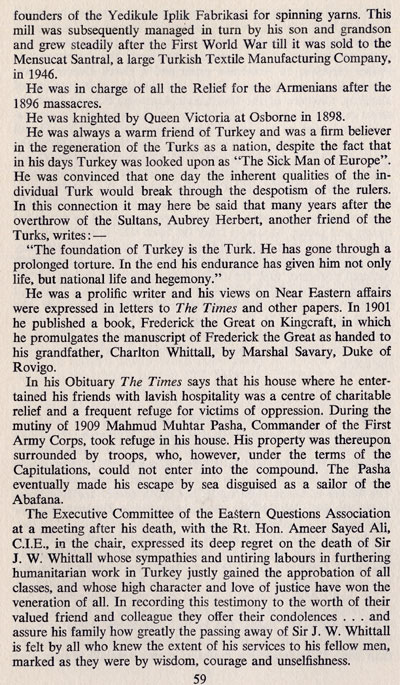 |
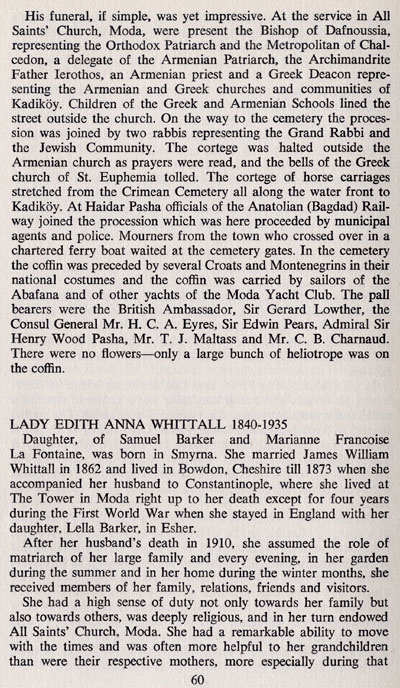 |
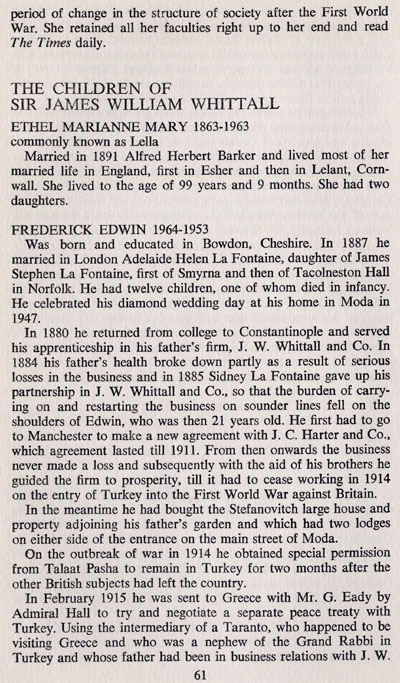 |
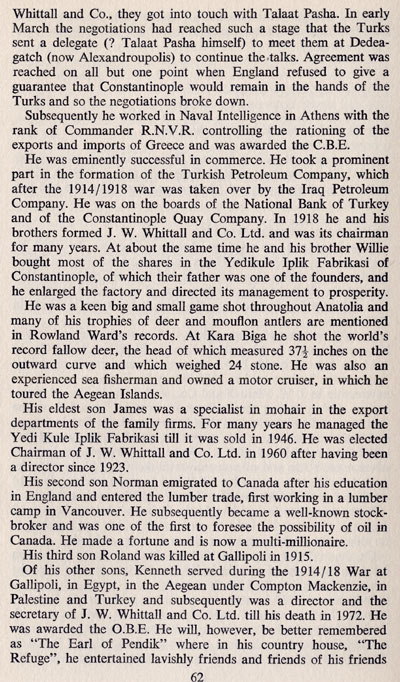 |
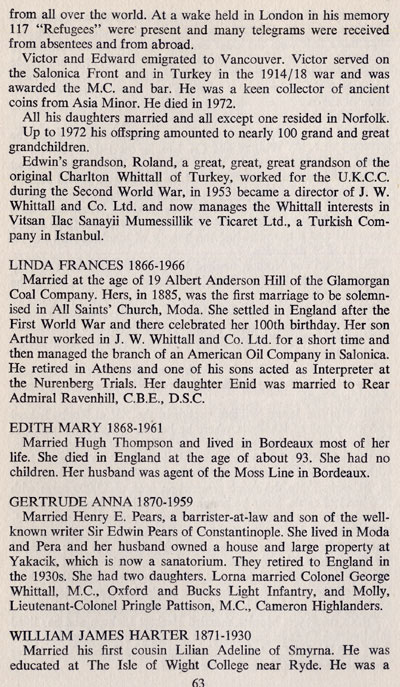 |
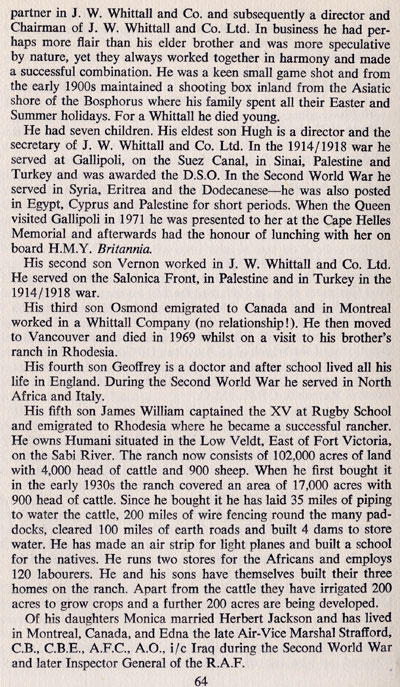 |
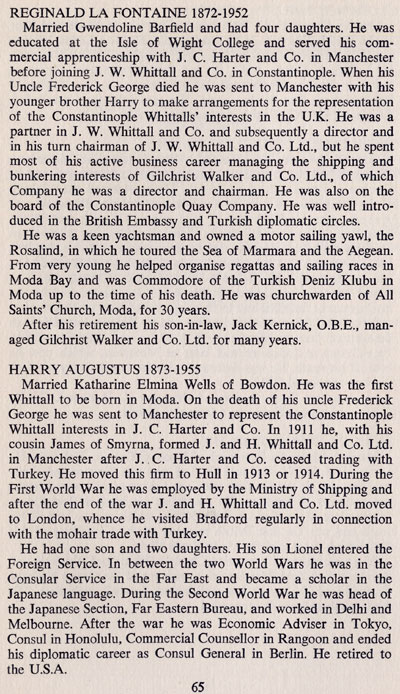 |
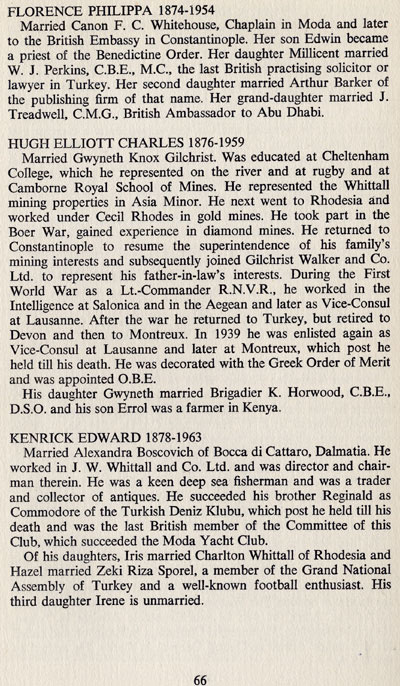 |
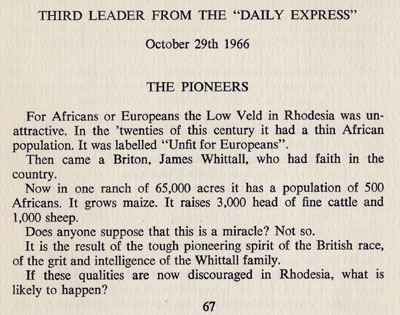 |
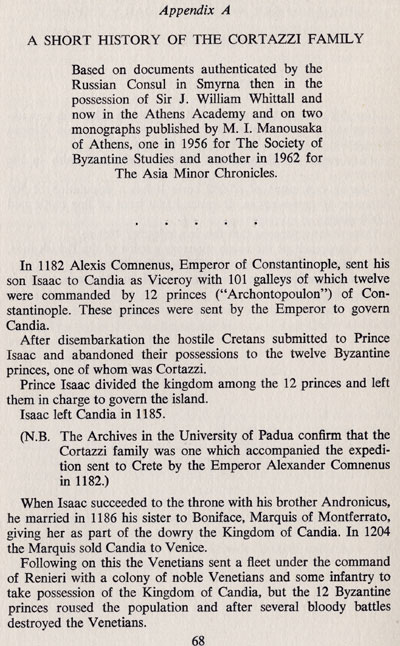 |
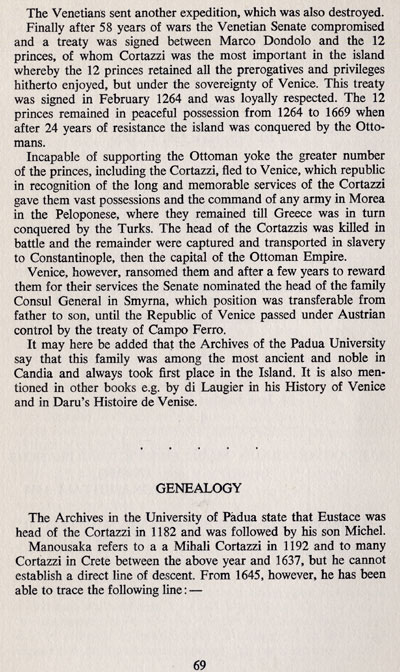 |
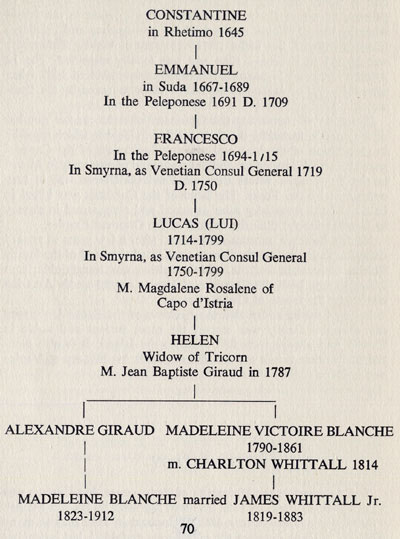 |
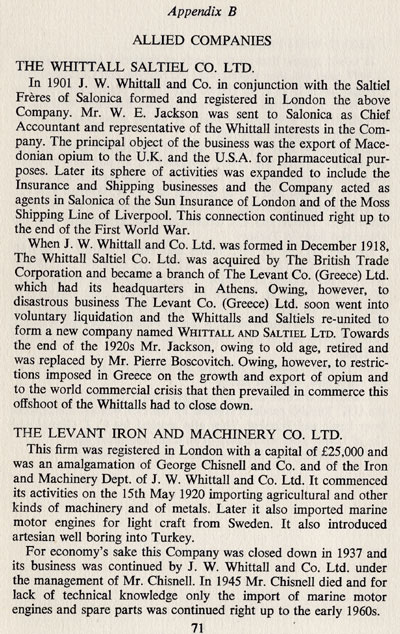 |
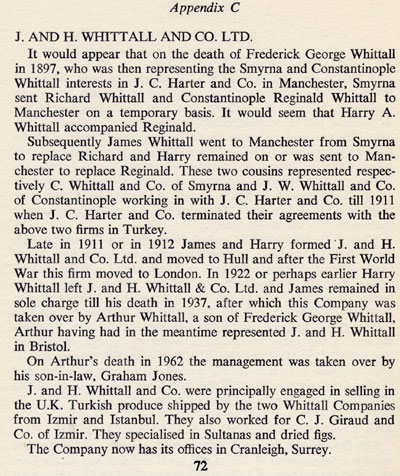 |